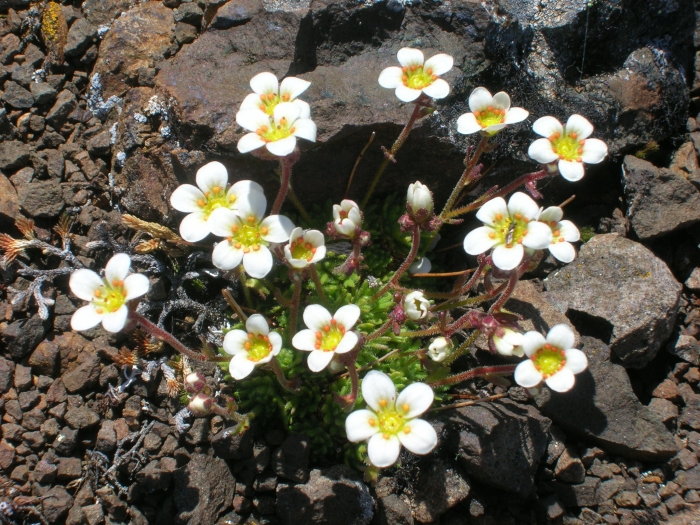Tufted Alpine Saxifrage
(Saxifraga cespitosa)
Tufted Alpine Saxifrage (Saxifraga cespitosa)
/
/

J Brew
CC BY-SA 4.0
Image By:
J Brew
Recorded By:
Copyright:
CC BY-SA 4.0
Copyright Notice:
Photo by: J Brew | License Type: CC BY-SA 4.0 | License URL: http://creativecommons.org/licenses/by-sa/4.0/ | Rights Holder: J Brew | Publisher: iNaturalist | Date Created: 2006-06-24T15:42:51-07:00 |
























Estimated Native Range
Summary
Saxifraga cespitosa, commonly known as Tufted Alpine Saxifrage or Tufted Saxifrage, is a perennial herb that thrives in the harsh conditions of arctic and alpine regions. Its native habitat includes rocky outcrops, tundra, and gravelly soils in areas such as the Alps, Norway, Scotland, Wales, Iceland, Siberia, and western North America. This plant is well-adapted to cold climates and high altitudes, often found in crevices and well-drained slopes.
Tufted Alpine Saxifrage forms dense, low-growing mats from a stout taproot, with short stems and small, lobed, evergreen leaves that provide year-round interest. In late spring to early summer, it produces flowering stems that are 2-4 inches tall, with showy white flowers that have petals twice the length of the calyx lobes, attracting pollinators. Its compact growth habit and tolerance of poor soils make it suitable for rock gardens, alpine houses, and as ground cover in suitable climates. It requires minimal maintenance, preferring full sun to partial shade and well-drained, gritty soil. While generally disease-free, it can suffer from root rot if overwatered or planted in poorly drained soils. Tufted Alpine Saxifrage is also valued for its ecological role in its native habitat, providing nectar for pollinators in environments where few plants can survive.CC BY-SA 4.0
Tufted Alpine Saxifrage forms dense, low-growing mats from a stout taproot, with short stems and small, lobed, evergreen leaves that provide year-round interest. In late spring to early summer, it produces flowering stems that are 2-4 inches tall, with showy white flowers that have petals twice the length of the calyx lobes, attracting pollinators. Its compact growth habit and tolerance of poor soils make it suitable for rock gardens, alpine houses, and as ground cover in suitable climates. It requires minimal maintenance, preferring full sun to partial shade and well-drained, gritty soil. While generally disease-free, it can suffer from root rot if overwatered or planted in poorly drained soils. Tufted Alpine Saxifrage is also valued for its ecological role in its native habitat, providing nectar for pollinators in environments where few plants can survive.CC BY-SA 4.0
Plant Description
- Plant Type: Herb
- Height: 0.1-0.3 feet
- Width: 0.1-0.5 feet
- Growth Rate: Moderate
- Flower Color: White
- Flowering Season: Summer
- Leaf Retention: Evergreen
Growth Requirements
- Sun: Full Sun, Part Shade
- Water: Medium
- Drainage: Medium, Fast
Common Uses
Border Plant, Groundcover, Low Maintenance, Rock Garden, Water Garden
Natural Habitat
Rocky outcrops, tundra, and gravelly soils in arctic and alpine regions
Other Names
Common Names: Tufted Saxifrage, Cushion Saxifrage
Scientific Names: , Saxifraga cespitosa, ? lauxiuscula, Evaiezoa caespitosa, Muscaria caespitosa, Muscaria caespitosa subsp. laxiuscula, Muscaria cespitosa subsp. exaratioides, Muscaria cespitosa subsp. lauxiuscula, Muscaria sileniflora, Saxifraga caespitosa
GBIF Accepted Name: